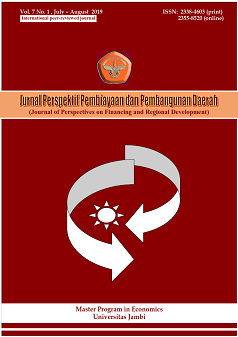Does political connectedness determine stock returns in Indonesia?
DOI:
https://doi.org/10.22437/ppd.v7i1.7290Keywords:
Political connection, Stock returns, Indonesia, Kompas 100 indexAbstract
This study aims to investigate the influences of political connection on stock returns in Indonesia. We develop a comprehensive database of firm-level political connectedness among Indonesian firms from 2010 to 2017. Our sample is non-financial Indonesian listed firms that are selected in the Kompas 100 index for 16 consecutive periods, with a total of 448 firm-year observations. This study employs panel data regressions to estimate this relationship, then mitigate possible endogeneity issues using two-stage least square with fixed-effects. The finding of this study shows that political connectedness is associated with lower stock returns, more prominently in agriculture and consumer goods industries. Moreover, state-owned enterprises are more likely to earn lower stock returns. In summary, our result suggests that investing in politically connected firms could be a risky investment. The finding holds using alternative estimation methods
Downloads
References
Addoum, J. M., & Kumar, A. (2016). Political sentiment and predictable returns. Review of Financial Studies (Vol. 29). https://doi.org/10.1093/rfs/hhw066
Amtiran, P. Y., & Indiastuti, R. (2017). Political Risk and Stock Returns in Indonesia. Journal of Finance and Banking Review, 2(3), 8–13.
Bank Indonesia. (2009). Economic report on Indonesia (Vol. 2008). Jakarta: Bank Indonesia
Bathia, D., & Goyal, A. (2013). Do governance levels influence investor sentiment?: The European evidence. Working Paper.
Boubakri, N., Cosset, J., & Saffar, W. (2008). Political connections of newly privatized firms. Journal of Corporate Finance, 14, 654–673. https://doi.org/10.1016/j.jcorpfin.2008.08.003
Cao, J., Huang, S., Liu, Q., & Tian, G. G. (2012). The stock market implication of political connections: evidence from firms’ dividend policy. Working Paper, FMA Asian Meeting (pp. 1-35). Phuket, Thailand: Financial Management Association International.
Chaney, P. K., Faccio, M., & Parsley, D. (2011). The quality of accounting information in politically connected firms. Journal of Accounting and Economics, 51, 2010–2012. https://doi.org/10.1016/j.jacceco.2010.07.003
Chen, C.J.P., Li, Z., Su, X., & Sun, Z. (2011). Rent-seeking incentives, corporate political connections, and the control structure of private firms: Chinese evidence. Journal of Corporate Finance, 17(2), 229–243. https://doi.org/10.1016/j.jcorpfin.2010.09.009
Chen, C.M., Ariff, M., Hassan, T., & Mohamad, S. (2014). Does a firm’s political connection to government have economic value? Journal of the Asia Pacific Economy, 19(1), 1–24. https://doi.org/10.1080/13547860.2013.860761
Chen, S., Sun, Z., Tang, S., & Wu, D. (2011). Government intervention and investment efficiency : Evidence from China. Journal of Corporate Finance, 17(2), 259–271. https://doi.org/10.1016/j.jcorpfin.2010.08.004
Civilize, S., & Young, M. (2015). Political Connection and Stock Returns : A Longitudinal Study. The Financial Review, 50, 89–119.
Claessens, S., Feijen, E., & Laeven, L. (2008). Political connections and preferential access to finance: The role of campaign contributions. Journal of Financial Economics, 88(3), 554–580. https://doi.org/10.1016/j.jfineco.2006.11.003
Defrizal, Sucherly, Wirasasmita, Y., & Nidar, S. R. (2015). The Determinant Factors Of Sectoral Stock Return In Bullish And Bearish Condition At Indonesian Capital Market. International Journal of Scientific & Technology Research, 4(07), 209–214.
Ding, M. (2014). Political Connections and Stock Liquidity: Political Network, Hierarchy and Intervention. Knut Wicksell Working Paper, (7).
Faccio, M. (2006). Politically Connected Firms. The American Economic Review, 96, 369–385.
Fama, E., & French, K. (1992). The Crossâ€Section of Expected Stock Returns. The Journal of Finance, XLVII(2), 427-465
Fan, J. P. H., Rui, M. O., & Zhao, M. (2008). Public Governance and Corporate Finance : Evidence from Corruption Cases. Journal of Comparative Economics, 36(3), 1–59
Fauzi, R., & Wahyudi, I. (2016). The effect of firm and stock characteristics on stock returns: Stock market crash analysis. The Journal of Finance and Data Sciences, 2(2), 112–124.
Ferris, S. P., Houston, R., & Javakhadze, D. (2016). Friends in the right places: The effect of political connections on corporate merger activity. Journal of Corporate Finance, 41, 81–102. https://doi.org/10.1016/j.jcorpfin.2016.08.011
Fisman, R. (2001). Estimating the Value of Political Connections. American Economic Review, 9(4), 1095–1102. https://doi.org/10.1057/9780230226203.1976
Ghosh, S. (2011). Price jitters: Do markets punish political stocks? MPRA Paper, (33170).
Glascock, J. L., Lu, C., & So, R. (2000). Further Evidence on the Integration of REIT , Bond , and Stock Returns. Journal of Real Estate Finance and Economics, 194, 177–194.
Hahn, J., & Lee, H. (2009). Financial Constraints , Debt Capacity , and the Cross-section of Stock Returns. The Journal of Finance, LXIV(2), 891–921.
Huang, H., & Zhao, Z. (2016). The influence of political connection on corporate social responsibility——evidence from Listed private companies in China. International Journal of Corporate Social Responsibility, 1(1), 1–19. https://doi.org/10.1186/s40991-016-0007-3
Leuz, C., & Oberholzer-Gee, F. (2006). Political relationships, global financing, and corporate transparency: Evidence from Indonesia. Journal of Financial Economics, 81(2), 411–439. https://doi.org/10.1016/j.jfineco.2005.06.006
Lin, K., Tan, J., Zhao, L., & Karim, K. (2015). In the name of charity : Political connections and strategic corporate social responsibility in a transition economy. Journal of Corporate Finance, 32, 327–346. https://doi.org/10.1016/j.jcorpfin.2014.10.007
Ling, L., Zhou, X., Liang, Q., Song, P., & Zeng, H. (2016). Political connections , overinvestments and firm performance : Evidence from Chinese listed real estate firms. Finance Research Letters, 0, 1–6. https://doi.org/10.1016/j.frl.2016.05.009
Martani, D., Mulyono, & Khairurizka, R. (2009). The Effect of Financial Ratios, Firm Size, and Cash Flow from Operating Activities in the Interim Report to the Stock Return. Chinese Business Review, 8(9).
Ministry of Industry Republic of Indonesia. (2012). Industry facts and figures.
Reinhart, C. M., & Rogoff, K. S. (2009). The Aftermath of Financial Crises. NBER Working Paper Series.
Shleifer, A., & Vishny, R. W. (1994). Politicians and firms. The Quarterly Journal of Economics, (November).
Su, Z. qin, & Fung, H. G. (2013). Political connections and firm performance in Chinese companies. Pacific Economic Review, 18(3), 283–317. https://doi.org/10.1111/1468-0106.12025
White, H. (1980). A Heterokedasticity-Consistent Covariance Matrix Estimator and a Direct Test for Heterokedasticity. Econometrica, 48 (4), 817-838
Wu, W., Wu, C., & Rui, O. M. (2012). Ownership and the Value of Political Connections: Evidence from China. European Financial Management, 18(4), 695–729. https://doi.org/10.1111/j.1468-036X.2010.00547.x
Yeh, Y. H., Shu, P. G., & Chiu, S. B. (2013). Political connections, corporate governance and preferential bank loans. Pacific Basin Finance Journal, 21(1), 1079–1101. https://doi.org/10.1016/j.pacfin.2012.08.003
Downloads
Published
Versions
- 2019-08-31 (1)
- 2019-08-31 (1)

















